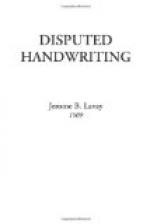The constant professional observation of handwriting in any line of financial or commercial business tends to confer expert skill. It should be said here, however, that the average bank cashier or teller bases his opinions and his identifications generally upon the pictorial effect without recourse to those minuter and more delicate points upon which the skilled expert rightly places the greatest reliance. Such testimony can not be compared for accuracy or value with that of the scientific investigator of handwriting. It follows, then, that one who is endowed with more than ordinary acuteness of observation, and has had an experience so varied and extensive as to cover most of these lines, is likely to be best fitted for critical and reliable expert work.
In a word, the trained expert eye, even on so slight a thing as a simple straight line, will detect certain peculiarities of motion, of force, of pressure, of tool-mark, etc., that in normal circumstances the result will stand for its author just as his photograph stands for him. Now, this being undoubtedly true within certain limitations, how more than incontestable must be the proposition to any rational man that if, instead of a simple undeviating pen-stroke, lines that run to curves and angles and slants, and shades and loops and ticks, and enter into all sorts of combinations, such as any specimen of handwriting must, however simple, bear inherent evidences of authorship that yield their secrets to the expert examiner as the hieroglyphics on an Egyptian monument do to a properly educated antiquarian.
The propriety of admitting the evidence of handwriting experts in investigating questions of forgery is now recognized by statute in most states. Common sense dictates that in all investigations requiring special skill, or when the common intelligence supposed to be possessed by the jury is not fully adequate to the occasion, we should accept the assistance of persons whose studies or occupations have given them a large and special experience on the subject. Thus such men of experience or experts are admitted to testify that work of a given description is or is not executed with ordinary skill; what is the ordinary price of a described article; whether described medical treatment or other practice was conducted with ordinary skill in a specific case; which of two colliding vessels, their respective movements being given, was in fault; whether one invention was an infringement of another, looking at the models of both; and other cases already mentioned.
This is as near to an exact definition of who are admissible as experts as it is possible for us to come. In all these cases it is to be observed that the expert is to speak from no knowledge of the particular facts which he may happen to possess, but is to pronounce the judgment of skill upon the particular facts proved by other witnesses. Of course the court must be first satisfied that the witness offered is a person of such special skill and experience, for if he be not, he can give no proper assistance to the jury; and of course, also, very much must at least be left to the discretion of the court, relative to the need of such assistance in the case; for very often the matter investigated may be so bunglingly done that the most common degree of observation may be sufficient to judge it.




